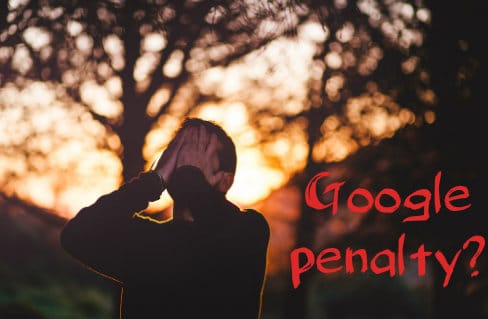Has your website recently dropped in rankings? One of the worst things that can happen to an online business owner nowadays is that they wake up and see their website penalized. A couple months ago, one of our clients came to us after their site had plunged in search engine results. They had assumed it was due to negative SEO, and they were partially correct. Understandably, this person was extremely anxious about whether they could ever regain their former position on the first page, but they did not know what steps to take.
Months, if not years of SEO efforts can go down the drain in an instant when your site is penalized. This kind of a blow won’t just affect your position in SERPs, but also your business. Sales and website traffic can drop by as much as 80-90%. And although a notification from Google (if you’re lucky) alerting you to the penalty can seem like the end of the world, it doesn’t have to be.
Luckily, there are several ways to recover your website from this kind of attack.
First, if your website is penalized by Google or its rank has suddenly dropped in SERPs, it can be due to one of these reasons:
- A Negative SEO strike from a competitor or an enemy
- An intentional violation of Google’s search engine optimization rules and practices
- The use of Black Hat SEO tactics to gain rank
- Using an incompetent SEO company that unintentionally got you penalized or de-ranked.
Most websites rely on search engines heavily when it comes to generating traffic, so a penalty will always affect your bottom line. If your website is among them, you need to stay up to date with all the newest algorithm updates. Whenever a new update rolls out, site owners need to make necessary adjustments so that your website remains within rules.
Which Google Penalties Exist?
Manual penalties
These penalties happen when an employee of Google personally visits and inspects your website and finds content that goes against Google’s Webmaster guidelines. You can find out if this is the case by using Google Search Console.
When you find which issues exactly have caused your website to be penalized, you can write to Google and submit a request for reconsideration. Be honest and polite with their team, they are people after all, and they are more likely to help if you’re professional.
Let them know that you believe that you have found out where the root of the problem was and that you have taken the necessary steps to repair the issue.
If Google turns down your request, it still isn’t the end of the world. Just bear in mind the process is not always straightforward.
You might need to do additional work on your website to demonstrate your commitment to the improvement of your website to their team. When you fix all the issues, submit another reconsideration request.
You can keep repeating this process until you receive a positive response from Google’s team. If you find yourself in a manual penalty, contact us to learn about how to remove a manual penalty in Google.
Algorithmic penalty due to negative SEO
This type of Google penalty is more complex than dealing with real people. When it comes to the algorithm penalty, Google employees never offer support or solution. As a matter of fact, usually, they issue a public statement addressing people who have been affected by this type of penalty.
Basically, that means that you’re on your own when this happens. There’s no reconsideration for these penalties, which leaves it up to you to locate and resolve the issue. In many cases, algorithmic penalties are a result of negative SEO.
Luckily, you are not alone. You will most probably be able to find the cause of your troubles online. Furthermore, you should be able to find the solution as well.
With algorithm penalties, discovering can be more difficult than with manual ones. You don’t get an email notification. However, you will notice a significant decrease in your website’s organic traffic. But we have to say, not every drop in rankings means that you have been hit. Sometimes, a drop can be a sign that your SEO strategy needs to be refreshed and altered.
 How to Recover A Penalized Website
How to Recover A Penalized Website
So your website is penalized by Google. You need to act quickly before you fall further. Identify the cause and clean up your website. Document the problem, learn about any and all practices that might lead to similar issues, and avoid them from now on. Google Webmaster Guidelines are very useful for this as long as you read them carefully.
Here are a few, simple steps you need to take to initiate site recovery:
Link Building
Bad links are usually a result of poor linking strategies or Negative SEO. If you find these linking to your website, you need to clean it up. For this process, you can use tools like Search Console, Ahrefs, and Majestic SEO. These tools will enable you to collect a full list of backlinks. As a result, you’ll be able to go through the list, determine which links are good and which ones are bad, and get rid of those that Google frowns upon. Once you clean everything up, learn all you can about positive link building strategies to avoid similar problems in the future. This is a tedious, time-consuming exercise and you should be prepared for a relatively steep learning curve.
Remove Negative SEO Backlinks
If there’s a list of negative backlinks on your website, you should remove them. First, you need to get a record of all your backlinks and analyze them one by one. This filtering part is more art than science, so you should use a links disavow service. They will go through all your links and isolate the toxic ones, aggregate them into a .txt file and upload it to Google Search Console. This will let Google know that you no longer want them to associate those links with your website. Once a Google processes your request and refreshes their backlinks record, you will typically notice a ranking improvement. If you undertake this yourself, be warned: if you accidentally cut positive links, it will hurt your website’s authority, but if you don’t cut out enough of the negative backlinks, your site will have little chance of recovering.
Ideally, if there are low-quality websites pointing to yours, you should reach out and notify them to manually remove those links. Our experience is that most will not respond, so don’t hold your breath.
Improve Your Content
If you notice a decrease in organic traffic after a change of strategy or a content update, you need to go through all of your on-site content. For instance, if your website was found guilty of copyright infringement, Google can ask you to either bring down the content or correct it. As well, if your language is off due to poor syntax or unoriginal content, you will need to edit, rewrite, and in some cases, remove that content. Writing compelling content for SEO is a full-time job, and quality over quantity is the general rule here.
In the End
Every business that relies on organic traffic to gain customers fears a Google penalty. If you are looking to avoid finding yourself in such a dreadful situation, you should definitely take our advice. Firstly, run regular SEO audits of your website. Secondly, locate and remove all spammy negative SEO links that can negatively affect your website’s reputation. And finally, remove any plagiarized content from your website, and replace it with high-quality, original content.
The very best way to avoid these penalties is to make sure that your website is credible, helpful, genuine, and up to date, but the faster you react to negative SEO attacks and Google penalties, the better!
Are you dealing with Google penalties now? Contact us, and let us help you recover your rankings today.

 How to Recover A Penalized Website
How to Recover A Penalized Website